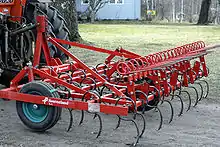harrow
See also: Harrow
English
WOTD – 23 January 2012

Harrow
Pronunciation
- (UK) IPA(key): /ˈhæɹəʊ/
- (US, Mary–marry–merry distinction) IPA(key): /ˈhæɹoʊ/
- (US, Mary–marry–merry merger) IPA(key): /ˈhɛɹoʊ/
(Mary–marry–merry distinction)Audio (US) (file)
(Mary–marry–merry merger)Audio (US) (file) - Rhymes: -æɹəʊ
Etymology 1
From Middle English harwe, harow, from Old English *hearwa (perhaps ultimately cognate with harvest), or from Old Norse harfr/herfi;[1] compare Danish harve (“harrow”), Dutch hark (“rake”). Akin to Latin carpere. According to the OED, the verb senses are partly derived from the noun sense, partly from a by-form of the verb harry, itself from Old English hergian.[2]
Noun
harrow (plural harrows)
- A device consisting of a heavy framework having several disks or teeth in a row, which is dragged across ploughed land to smooth or break up the soil, to remove weeds or cover seeds; a harrow plow.
- 1918, Louise & Aylmer Maude, Anna Karenina, Oxford, translation of original by Leo Tolstoy, published 1998, page 153:
- He sent for the carpenter, who was under contract to be with the threshing-machine, but it turned out that he was mending the harrows, which should have been mended the week before Lent.
- 1960, P. G. Wodehouse, Jeeves in the Offing, chapter X:
- “It may be fun for her,” I said with one of my bitter laughs, “but it isn't so diverting for the unfortunate toads beneath the harrow whom she plunges so ruthlessly in the soup.”
- 1969, Bessie Head, When Rain Clouds Gather, Heinemann, published 1995, page 28:
- Part of your job would be to learn tractor ploughing and the use of planters, harrows, and cultivators.
- (military) An obstacle formed by turning an ordinary harrow upside down, the frame being buried.
Translations
device
|
See also
Verb
harrow (third-person singular simple present harrows, present participle harrowing, simple past and past participle harrowed)
- (transitive) To drag a harrow over; to break up with a harrow.
- 1611, The Holy Bible, […] (King James Version), London: […] Robert Barker, […], →OCLC, Job 39:10:
- Will he harrow the valleys after thee?
- 1719 May 6 (Gregorian calendar), [Daniel Defoe], The Life and Strange Surprizing Adventures of Robinson Crusoe, […], London: […] W[illiam] Taylor […], →OCLC:
- When the corn was sown, I had no harrow, but was forced to go over it myself, and drag a great heavy bough of a tree over it, to scratch it, as it may be called, rather than rake or harrow it.
- (transitive) To traumatize or disturb; to frighten or torment.
- c. 1599–1602 (date written), William Shakespeare, “The Tragedie of Hamlet, Prince of Denmarke”, in Mr. William Shakespeares Comedies, Histories, & Tragedies […] (First Folio), London: […] Isaac Iaggard, and Ed[ward] Blount, published 1623, →OCLC, [Act I, scene i]:
- It harrows me with fear and wonder.
- c. 1599–1602 (date written), William Shakespeare, “The Tragedie of Hamlet, Prince of Denmarke”, in Mr. William Shakespeares Comedies, Histories, & Tragedies […] (First Folio), London: […] Isaac Iaggard, and Ed[ward] Blount, published 1623, →OCLC, [Act I, scene v], page 257, column 2:
- I could a Tale vnfold, vvhoſe lighteſt vvord / VVould harrovv vp thy ſoule, freeze thy young blood, / Make thy tvvo eyes like Starres, ſtart from their Spheres, / Thy knotty and combined locks to part, / And each particular haire to ſtand an end, / Like Quilles vpon the fretfull Porpentine: […]
- 1820, Washington Irving, The Legend of Sleepy Hollow:
- The headless horseman harrowed Ichabod Crane as he tried to reach the bridge.
- (transitive) To break or tear, as if with a harrow; to wound; to lacerate; to torment or distress; to vex.
- 1707, Nicholas Rowe, The Royal Convert:
- my aged muscles harrow'd up with whips
Derived terms
Translations
drag a harrow over
|
traumatise, frighten
|
Etymology 2
From Middle English harrow, harrowe, haro, from Old French haro, harou, harau, harol, from Frankish *harot, *hara (“here; hither”), from *hēr. Akin to Old Saxon herod, Old High German herot, Middle Dutch hare.
Interjection
harrow
- (obsolete) A call for help, or of distress, alarm etc.
- 1590, Edmund Spenser, “Book II, Canto VI”, in The Faerie Queene. […], London: […] [John Wolfe] for William Ponsonbie, →OCLC:
- Harrow, the flames, which me consume (said hee) / Ne can be quencht, within my secret bowels bee.
References
- According to ODS: "eng. harrow maaske laant fra nordisk", i.e. "English harrow [is] possibly loaned from Norse".
- “harrow”, in OED Online
 , Oxford, Oxfordshire: Oxford University Press, launched 2000.
, Oxford, Oxfordshire: Oxford University Press, launched 2000.
Anagrams
This article is issued from Wiktionary. The text is licensed under Creative Commons - Attribution - Sharealike. Additional terms may apply for the media files.